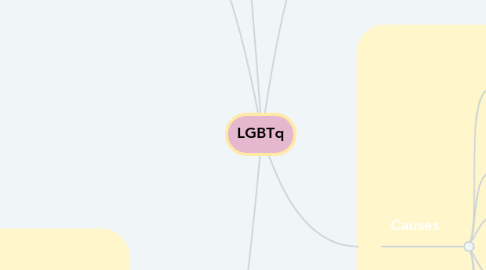LGBTq
Hawa Izlynにより

1. Effects
1.1. 1. Employment Discrimination
1.1.1. LGBT adults are treated by employer unfairly because of their sexuality or gender identity.
1.1.2. They experience on-the-job harassment or mistreatment.
1.1.3. Most of them were fired, not-hired or denied a promotion, according to national survey.
1.2. 2. Poverty
1.2.1. LGBT workers are more likely to earn less annually (below £10,000) a year than average American.
1.2.2. Same-sex couples are two times more likely to live in poverty than different-sex couples.
1.2.3. Single LGBT adults are 1.2 times poorer than their straight counterparts.
1.3. 3. Health care
1.3.1. LGBT people have difficulty in accessing care and obtaining insurance, which leads to higher rate of disease.
1.4. 4. Violence
1.4.1. Lesbian, gay and transgender people, especially those of color, experience violence at disproportionately high rates compared to straight gender people.
2. Ways to overcome
2.1. 1. Parents are responsible for their kids by being the first educator, especially at home. parents should also pay attention towards a changed behaviour, which can be one of the first sign.
2.2. 2. The family members and friends (people who are closest by heart) as support systems to the community, as a way to encourage self-betterment.
2.3. 3. Seek help by the people who were involved in the LGBTq. This is because they experienced the change first hand and have more personal input towards the problem.
3. Additional Info(s)
3.1. 1. The state of LGBT rights in Malaysia
3.2. Homosexuality is illegal in Malaysia, and its roots go back to Malaysia’s colonial past, when it inherited British laws against sodomy known as Section 377. While India ruled to decriminalize this law in 2018, Malaysian society’s attitudes towards LGBT persons suggests that this is still a long way off. Censorship of movies and books that contain LGBT themes are still commonplace, and a 2016 poll revealed that almost half of all Malaysians do not believe same-sex marriage should be legal.
3.3. 2. Religion and its influence on policing sexuality
3.4. As a Muslim-majority society, religion, specifically Islam, has had a large influence on politics and societal norms. Many Malaysians believe homosexuality to be incompatible to their religious beliefs. Furthermore, Muslims in Malaysia are governed by a parallel system of Sharia law, and officials from the religious department (JAKIM) are known to conduct moral policing targeting Malay-Muslims caught flouting Islamic norms, such as engaging in ‘homosexual acts’. This adds another layer of persecution faced by the Malaysian LGBT community.
3.5. 3. Statistics of LGBT worldwide
3.6. The study found that 97.4% of men identified as heterosexual, 1.6% as homosexual and 0.9% as bisexual. For women 97.7% identified as heterosexual, 0.8% as lesbian and 1.4% as bisexual.
3.7. 4. Familiarity with the LGBT community in Malaysia as of 2016
3.8. In a survey conducted in Malaysia in 2016, around 36 percent of respondents stated that they personally knew someone from the LGBT community. This contradicts the statement made by Malaysia’s tourism minister in March 2019 that there are no gay people in Malaysia.
4. Definition
4.1. An acronym for lesbian, gay, bisexual, transgender and queer or questioning. These terms are used to describe a person’s sexual orientation or gender identity
5. Causes
5.1. 1. Culture
5.2. It is because culture affects our views on homosexuality. Ex: In more advance and modern societies, homosexuality is accepted as human rights so people will think that it’s okay to do that.
5.3. 2. Lack of religious education
5.4. All religions disagree with LGBTq or homosexual because it’s against the human nature
5.5. 3. Hormone
5.6. Hormonal shifts during pregnancy could affect how fetus brain is configured. In rats, manipulation of hormones during pregnancy produces offspring that exhibit homosexual behaviour.


